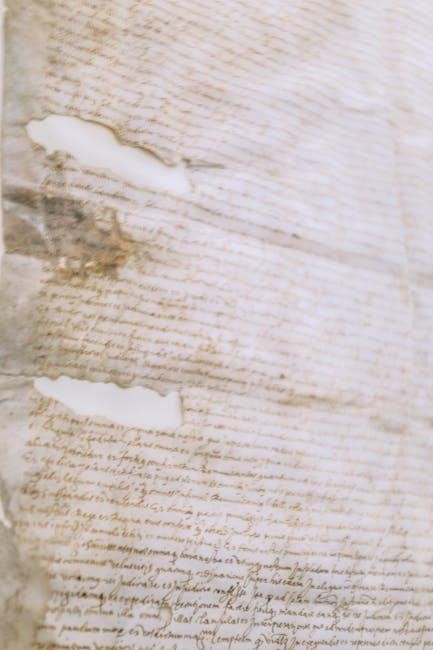French cheat sheets are concise tools offering essential language tips, grammar rules, and vocabulary. PDF versions provide easy access to phrases, verb conjugations, and pronunciation guides for learners.
1.1 What Are French Cheat Sheets?
French cheat sheets are practical study aids designed to simplify language learning. They typically cover essential grammar, vocabulary, and phrases in a concise, organized format. Available as PDFs, these sheets are portable and easy to access. Many focus on specific areas like verb conjugations, pronunciation, or common expressions. They are ideal for quick reference, helping learners of all levels master key aspects of the French language efficiently. Popular among students and travelers, they provide a handy overview of important linguistic elements.
1.2 Importance of Cheat Sheets for Language Learning
Cheat sheets are invaluable for language learning due to their concise and organized format. They provide quick access to essential grammar rules, vocabulary, and phrases, making study sessions more efficient. Portable and easy to review, they aid in retaining information and mastering key linguistic elements. Cheat sheets are particularly beneficial for beginners, offering a clear overview of complex concepts. They also boost confidence, enabling learners to communicate effectively in real-life situations. Their accessibility and focus on practical knowledge make them a must-have resource for anyone learning French.
1.3 Popular Formats: PDF and Printable Versions
PDF and printable versions of French cheat sheets are widely popular due to their convenience. PDFs are easily downloadable and maintain formatting across devices, making them ideal for quick reference. Printable versions allow learners to create physical copies for on-the-go study. Both formats are versatile, catering to different learning preferences. They often include visual layouts, such as tables for verb conjugations or flashcard-style vocabulary lists. This accessibility ensures that learners can efficiently review essential French language elements, whether digitally or in print, enhancing their study experience.

French Grammar Cheat Sheets
French grammar cheat sheets simplify complex rules, covering verb conjugations, tenses, and exceptions. They provide clear guides for learners to master grammar quickly and effectively.
2.1 Tenses and Conjugations
French grammar cheat sheets dedicated to tenses and conjugations provide a detailed breakdown of regular and irregular verbs. They cover present, past, and future tenses, including composite forms like the passé composé and imperfect subjunctive. These sheets often include conjugation tables for common verbs, such as être, avoir, and faire, as well as examples of usage in sentences. Many PDF versions offer clear charts and tips for mastering irregular verb patterns, making them invaluable for learners at all levels.
- Covers all major tenses and moods.
- Includes irregular verb conjugations.
- Provides practical examples for context.
These resources are particularly helpful for learners preparing for exams or seeking to improve their writing and speaking skills.
2.2 Past Participles and Their Usage
Past participles in French are essential for forming compound tenses like the passé composé and plus-que-parfait. Cheat sheets often list common past participles, such as parlé (spoken), fini (finished), and fait (done). They also highlight irregular forms, like vu (seen) and vécu (lived). These resources clarify usage rules, such as agreement with feminine or plural subjects, e.g., parlée or parlées. Examples are provided to illustrate correct usage in sentences.
- Covers regular and irregular past participles.
- Explains gender and number agreement.
- Provides sentence examples for clarity.
Mastering past participles is vital for constructing accurate compound tenses in French.
2.3 The Subjunctive Mood Explained
The subjunctive mood in French is used to express doubt, uncertainty, wishes, or hypothetical situations. Cheat sheets often provide conjugation charts for regular and irregular verbs, such as être and avoir, in the subjunctive form. They also highlight common triggers like que, qu’il, and quoique. Examples are included to illustrate usage, such as Il faut que nous partions (We must leave). These guides also address common mistakes, like confusing the subjunctive with the indicative mood. Mastering the subjunctive is key to advanced French fluency.
- Covers conjugations for regular and irregular verbs.
- Identifies common subjunctive triggers.
- Provides examples to clarify usage.

French Vocabulary Cheat Sheets
French vocabulary cheat sheets offer essential words and phrases, covering greetings, days, months, and common expressions. They simplify learning with organized lists and translations, aiding quick reference and effective language acquisition.
3.1 Common Phrases and Expressions
French cheat sheets provide essential common phrases and expressions, such as greetings, introductions, and everyday interactions. Phrases like “Bonjour” (hello), “Merci” (thank you), and “Comment ça va?” (how are you?) are included. These resources often cover situational dialogues, making them practical for travelers and learners. Many PDFs also include translations and pronunciation guides, ensuring easy understanding. They are designed for quick reference, helping users communicate confidently in French. Downloadable versions are widely available, offering a convenient way to master daily conversations and cultural interactions effectively.
3.2 Essential Vocabulary for Beginners
French vocabulary cheat sheets offer a foundational list of words and terms for beginners. They include common greetings, numbers, days of the week, and months. Basic phrases like “Bonjour” (hello), “Au revoir” (goodbye), and “De rien” (you’re welcome) are highlighted. These resources often categorize words by theme, such as food, family, and travel. Many PDFs provide pronunciation guides and usage examples, making it easier to memorize and apply the vocabulary in real-life situations. These cheat sheets are designed to help learners build a strong lexical base quickly and confidently.
3.3 Slang and Informal Language
French slang and informal language cheat sheets reveal everyday expressions used by native speakers. Phrases like “C’est cool” (it’s cool) and “Je m’en fiche” (I don’t care) are common. These resources often include colloquial terms like “Potluck” (a small amount of money) and “Bling-bling” (showy jewelry). Slang varies by region, with Parisian terms differing from those in other areas. Cheat sheets also cover informal greetings like “Salut” (hi) and “Ça va?” (how are you?). Learning these expressions helps speakers sound more natural and connect with locals.

French Pronunciation Cheat Sheets
French pronunciation cheat sheets clarify accents, diacritics, and tricky sounds. They highlight silent letters and exceptions, aiding learners in mastering nasal vowels and difficult consonant combinations effectively online.
4.1 Accents and Diacritics
French accents and diacritics, such as é, ñ, ç, and ô, are essential for correct pronunciation and meaning. Cheat sheets often highlight these marks, explaining their usage in words like café and naïve. They simplify learning by providing clear examples and rules, ensuring learners master these distinctive French language features effectively.
4.2 Difficult Sounds for Non-Native Speakers
French cheat sheets often address challenging sounds for non-native speakers, such as the guttural “r” in rouge or the vowel “u” in tu. These resources provide tips to master nasal vowels like un and vin, as well as silent letters in words like neuf and patisserie. By highlighting these tricky sounds, cheat sheets help learners improve pronunciation and reduce accent barriers, making French more approachable and easier to speak confidently.
4.3 Silent Letters and Their Exceptions
French cheat sheets often highlight silent letters, such as the “e” at the end of words like neuf or the “g” in parler. They also cover exceptions, like the pronounced “g” in faisant or the “d” in patisserie. These resources clarify when letters like “h” are silent, as in hôtel, or pronounced, as in le. Understanding silent letters is crucial for proper pronunciation, and cheat sheets provide clear examples to help learners master these nuances.

French Travel and Dining Cheat Sheets
French travel and dining cheat sheets provide essential phrases for navigating restaurants, hotels, and cultural interactions. They include key food vocabulary, etiquette tips, and common expressions for travelers.
5.1 Essential Travel Phrases
French travel cheat sheets offer essential phrases for everyday situations, such as greetings (bonjour, merci), asking directions (excusez-moi, où est…?), and common expressions like s’il vous plaît and au revoir. They also include phrases for dining, transportation, and emergencies, helping travelers communicate effectively. Many PDF guides organize these phrases by category, making them easy to reference. These resources are invaluable for visitors, ensuring smooth interactions and a more enjoyable experience in France.
5.2 Dining Out in France: Key Vocabulary
French dining cheat sheets provide essential vocabulary for restaurant interactions, including food terms like appétits, plats principaux, and desserts. Phrases such as la carte, s’il vous plaît (the menu, please) and l’addition, s’il vous plaît (the bill, please) are included. Common expressions like une carafe d’eau, s’il vous plaît (a glass of water, please) and le vin rouge (red wine) are also highlighted. These resources often list numbers, meal times (déjeuner, dîner), and polite requests, making dining in France more accessible and enjoyable for travelers.
5.3 Cultural Tips for Interacting with Locals
Cultural tips in French cheat sheets emphasize the importance of politeness and respect. Greetings like Bonjour (hello) and Merci (thank you) are essential. Using formal language (vous) with strangers or elders is customary. Understanding body language and maintaining appropriate physical distance is key. Respecting local customs, such as not eating on the go, demonstrates cultural awareness. These tips help learners navigate social interactions smoothly, fostering positive connections with French-speaking communities and enhancing their travel or work experiences.

French Business Cheat Sheets
French business cheat sheets offer professional communication tools, including formal greetings, email templates, and workplace vocabulary. They simplify interactions and enhance business correspondence in French-speaking environments.
6.1 Business Communication Phrases
French business communication cheat sheets provide essential phrases for professional interactions. They include formal greetings like Bonjour, comment ça va? and introductions such as Je m’appelle…. These tools also cover email templates, meeting etiquette, and common workplace expressions. Phrases like Pouvez-vous m’aider? (Can you help me?) and Je suis désolé(e) pour le retard (I’m sorry for the delay) are included. These resources help learners master professional communication, making business interactions in French-speaking environments more efficient and polite. They are ideal for professionals and learners preparing for workplace scenarios.
6.2 Writing Professional Emails in French
French business email cheat sheets provide templates and key phrases for professional correspondence. They include formal greetings like Bonjour, Madame/Monsieur and polite closings such as Cordialement, [Your Name]. These resources also cover common expressions for meeting arrangements, deadline reminders, and apologies. For example, phrases like Pouvez-vous me confirmer la réunion? (Can you confirm the meeting?) or Je suis désolé(e) pour le retard (I’m sorry for the delay) are essential. These tools help learners craft clear, professional emails, ensuring effective communication in French-speaking business environments.
6.3 Vocabulary for Business Meetings
French business meeting cheat sheets equip learners with essential vocabulary and phrases. Key terms include agenda-related words like l’ordre du jour (agenda) and decision-making phrases such as prendre une décision (to make a decision). Common expressions like Je propose que… (I suggest that.;.) and Quel est votre avis? (What is your opinion?) are highlighted. These resources also cover negotiation terms and formal language, enabling learners to participate confidently in professional meetings and discussions.

French Technology and Programming Cheat Sheets
French tech cheat sheets cover programming essentials like Git, Python, and SQL in French. They provide command translations, syntax guides, and technical vocabulary for developers and learners.
7.1 Linux Commands in French
French Linux cheat sheets provide translations and explanations of essential commands, making it easier for French-speaking users to navigate and manage systems. Common commands like cd, ls, and mkdir are translated and explained in French. These guides often include examples of command usage, such as creating directories or listing files. Advanced commands like grep and sudo are also covered, helping users master system administration. Many resources, like the IDRIS cheat sheet, offer PDF downloads with Linux, module, and SLURM commands specifically for French learners. These tools are invaluable for developers and system administrators working in French-speaking environments.
7.2 SQL Commands and Syntax
French SQL cheat sheets simplify learning essential database commands and syntax. They cover basic operations like SELECT, INSERT, UPDATE, and DELETE, with translations and examples. These guides explain how to structure queries, use WHERE clauses, and combine conditions with AND/OR. They also detail advanced concepts like JOINs and GROUP BY. Many resources provide syntax examples in French, making it easier for learners to grasp SQL fundamentals. Downloadable PDFs ensure quick access to these essential commands for database management and querying.
7.3 Git Commands Explained in French
French Git cheat sheets provide detailed explanations of essential commands, making version control accessible to French-speaking learners. They cover basics like git init, git add, and git commit, as well as advanced operations such as git branch and git merge. These guides often include translations of command outputs and common Git workflows. Many resources offer step-by-step examples in French, helping users understand concepts like repositories, commits, and collaboration. Downloadable PDFs ensure easy access to these explanations, aiding developers in mastering Git efficiently.
7.4 Python Basics in French
French Python cheat sheets provide a clear overview of programming fundamentals, including basic syntax, data types, loops, and functions. They often cover essential concepts like variables, conditionals, and lists, with examples translated into French. Many resources include sections on object-oriented programming and error handling. These guides are ideal for beginners, offering a structured approach to learning Python. Popular cheat sheets also highlight common libraries and modules, making it easier for learners to transition to practical applications. Downloadable PDF versions ensure easy access to these foundational programming concepts.
7.5 Web Development Terms in French

French Exam Preparation Cheat Sheets
French exam cheat sheets provide essential phrases, grammar rules, and vocabulary for tests like AP French, DELF, and DALF. They offer concise study guides for quick review.
8.1 AP French Exam Review
The AP French exam requires mastery of grammar, vocabulary, and conversational skills. Cheat sheets provide concise reviews of tenses, verb conjugations, and common phrases. They also include essay prompts, listening comprehension strategies, and cultural references. Downloadable PDF guides offer structured study charts, ensuring quick access to essential concepts. These resources help students focus on high-yield topics, boosting confidence and performance. Printable versions allow for easy practice and review, making them invaluable for last-minute preparation.
8.2 DELF and DALF Exam Preparation
DELF and DALF exams assess French language proficiency at various levels. Cheat sheets provide essential vocabulary, grammar tips, and exam strategies. PDF guides cover listening, reading, writing, and speaking sections, with sample questions and answers. They also include tips for mastering French pronunciation and understanding cultural references. These resources help candidates focus on weak areas and improve their performance. Downloadable cheat sheets offer structured study aids, ensuring comprehensive preparation for all exam levels, from A1 to C2.
8.3 Common Exam Vocabulary and Phrases
French exam cheat sheets highlight essential vocabulary and phrases frequently tested in exams. These include high-frequency words, idiomatic expressions, and key phrases for tasks like essay writing and oral presentations. PDF guides categorize words by topic, such as family, work, and daily activities, making studying efficient. They also cover common verbs, adjectives, and prepositions. Regularly updated, these resources ensure learners are familiar with exam formats and recurring phrases, helping them prepare effectively for various exam sections and boost confidence.

French Cultural and Idiomatic Cheat Sheets
Cultural cheat sheets offer insights into French etiquette, traditions, and idiomatic expressions, helping learners understand nuances like sarcasm, humor, and common proverbs used in daily conversations.
9.1 French Culture and Etiquette
Cultural cheat sheets provide insights into French social norms, such as greetings, dining etiquette, and appropriate behavior in formal and informal settings. They highlight the importance of politeness, like using bonjour or merci, and understanding gestures. These guides also cover cultural nuances, such as respecting personal space and avoiding overly casual language with strangers. Additionally, they often include tips for interacting with locals, making them invaluable for travelers and learners aiming to blend in seamlessly.
By mastering these cultural tips, learners can navigate everyday situations with confidence, ensuring respectful and meaningful interactions in France.
9.2 Idiomatic Expressions and Proverbs
French cheat sheets often include a wealth of idiomatic expressions and proverbs, which are essential for mastering the language’s cultural and conversational nuances. These expressions, like “tomber dans les pommes” (to faint) or “cracher en pleine tempête” (to waste effort), add color and depth to speech. Proverbs, such as “À l’œuvre, on connaît l’artisan” (you know the artisan by their work), provide timeless wisdom. Cheat sheets categorize these phrases, making them easy to learn and use in context.
9.3 Understanding French Sarcasm and Humor
French sarcasm and humor often rely on subtle wordplay, irony, and cultural references. Cheat sheets highlight common sarcastic expressions like “C’est bien sûr!” (Sure thing!), used ironically to express doubt. Humorous phrases, such as “Prends ton temps, on a toute la vie!” (Take your time, we’ve got all day!), reveal the French knack for dry wit. These resources also explain regional jokes and wordplay, helping learners grasp the nuances of French humor and sarcasm in everyday conversations.

French Cheat Sheet Resources
Discover top resources for French PDF cheat sheets, including websites like Cheatography, offering free downloads for grammar, vocabulary, and travel phrases, perfect for learners and travelers alike.
10.1 Where to Download French Cheat Sheets
French cheat sheets in PDF format are widely available online. Platforms like Cheatography offer free downloads covering grammar, vocabulary, and phrases. Websites such as FrenchPod101 provide comprehensive PDF lessons for all skill levels. Additionally, sites like TemplateRoller and GitHub repositories offer specialized cheat sheets for topics like Git commands and Linux. Many educational platforms also share downloadable resources for exam preparation and language learning.
10.2 How to Create Your Own Cheat Sheets
To create your own French cheat sheets, start by identifying key concepts, such as grammar rules or vocabulary. Use tools like Canva, Google Docs, or Excel to organize the content visually. Include examples, tables, and charts for clarity. Focus on essential information and avoid clutter. Save your document as a PDF for easy sharing and accessibility. Customize the design with colors and fonts to enhance readability. You can also add images or icons for visual appeal. Share your cheat sheets online or print them for personal use.
10.3 Benefits of Using Cheat Sheets for Language Learning
Cheat sheets are invaluable for language learning, offering quick access to essential vocabulary, grammar, and phrases. They help learners save time by organizing information concisely, making revision easier. Portable and customizable, cheat sheets can be tailored to individual needs, enhancing retention and understanding. PDF formats ensure accessibility across devices, while printed versions provide a tactile study aid. Regular use of cheat sheets fosters confidence and fluency, making them a practical tool for both beginners and advanced learners.